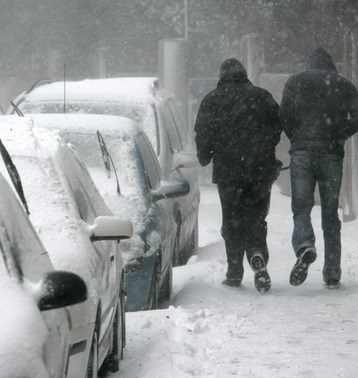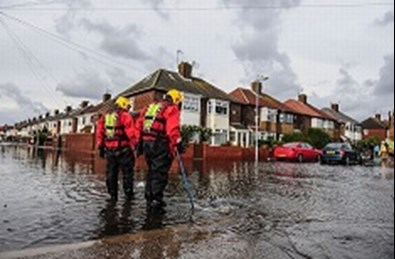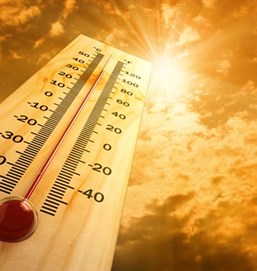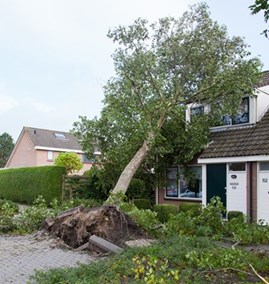Severe Weather



The lead agency for severe weather events depends on the type and impacts of the weather.
ON MERSEYSIDE
Merseyside generally has a temperate maritime climate with typically warm rather than hot summers and cool to cold winters. The effect of our west coast location means that weather extremes are sometimes moderated, however, there is a risk of heavy rainfall, snow and strong winds on occasion. Like much of the UK, our weather can be unpredictable, with severe weather most notably tending to affect transport, utilities and communications.
We are unable to reduce the likelihood of severe weather, however, by being prepared for such events we can reduce the impact to ourselves and our communities.
CONSEQUENCES
- The impacts of severe weather are varied, some common issues include travel disruptions, damage and disruption to basic utilities and damage to property.
- Severe weather affects individuals, the community, businesses and the ability of agencies to deliver essential services to the community.
WHAT ARE WE DOING IN MERSEYSIDE?
- We have plans in place to manage and co-ordinate the agencies responding to severe weather events;
- When we plan for big events like the Grand National, parades or other public events we take the likely weather conditions into account.
WHAT CAN YOU DO TO HELP YOUR COMMUNITY?
- The Met Office have recently updated their Community Resilience leaflet which provides practical steps to take to prepare for severe weather. Please download a copy and share with members of your community.


BEFORE
- Listen to weather forecasts and pay attention to any warnings of extreme weather;
- visit the 'WeatherReady', 'UK Weather Warnings' and 'UK Storm Centre' webpages provided by the Met Office;
- visit the 'Be Winter Ready' webpage provided by the Energy Networks Association;
- visit the NHS Winter Health webpages for tips on how to stay healthy over winter;
- view the 'Volunteering and Neighbourliness, Helping out in severe weather' document.
To 'Get Ready for Winter' you should:
- Prepare your property and vehicle ahead of winter and take responsibility for your own safety;
- fit draught proofing to seal any gaps around windows and doors;
- make sure you have loft insulation and if you have cavity walls, make sure they are insulated too;
- insulate your hot water cylinder and pipes;
- draw your curtains at dusk to help keep heat generated inside your rooms;
- make sure your radiators are not obstructed by furniture or curtains;
- be aware of the latest weather forecasts and warnings from the Met Office;
- be prepared to alter your plans in times of severe weather;
- keep an eye on the elderly and vulnerable members of your community this winter, check on them in times of severe weather, discourage them from going outside when it’s icy and help them with shopping; if possible;
- cold weather affects the health of the elderly often resulting in slips and falls or hypothermia which can be fatal. Keep an eye on those who might be vulnerable and ensure they are well looked after and warm;
- identify if the roads you use are priority gritting routes, if they are not, then you may need to do some extra planning for travelling during winter weather;
- when travelling in potentially bad weather prepare for the unexpected by packing a survival kit should you be stranded somewhere (check Highways England website for detailed information and any traffic information that may result in you cancelling or changing your timing and or route);
- if travelling by public transport, check on a regular basis, the local travel updates provided by Merseytravel.
To 'Be Winter Ready' you should:
- Know your free emergency numbers - in a power cut dial 105 or, for a gas emergency, dial 0800 111999;
- prepare your home - keep a torch handy and get your appliances serviced by a Gas Safe registered engineer to prevent carbon monoxide poisoning. Vulnerable households can get extra support by signing up to the Priority Services Register. Contact your gas or electricity network to find out more. Visit www.energynetworks.org to find out who your network operator is;
- keep your eyes open - keep an eye on the weather forecast and, if you lose your electricity supply or have a gas emergency, check on your neighbours.
DURING
Keep warm, keep well
- Cold weather brings with it bugs and viruses. Keep warm and well this winter by preparing for illness as much as you can, especially if you (or your loved ones) suffer from asthma, CoPD or other illnesses where sudden drops in temperature can affect health;
- You should heat your home to a temperature that is comfortable for you. In rooms you mostly use such as the living room or bedroom, try to heat them to at least 18°C if you can, particularly if you have a pre-existing medical condition. You should also keep your bedroom windows closed at night. Exposure to low indoor temperatures can have a serious impact on your health as you get older. Wearing several layers of clothing will keep you warmer than one thicker layer.
- Visit the Warm Welcome Spaces website for locations near your home that you can visit, make new friends and connect with your community whilst sharing a hot drink.
Look after yourself
- If you’re aged 50 or over, or are a carer, you’re may be eligible for a free flu jab and or other boosters in winter. Contact your GP or pharmacist or visit the NHS website to learn more.
- Don’t delay treating minor winter ailments like colds or sore throats. Visit your local pharmacist for advice and treatment.
- If you are feeling down or out of sorts, chat to someone or contact your GP.
- Wear shoes with good grip when you go outside to avoid slips and falls on slippery or icy surfaces.
- When you’re indoors, try not to sit still for more than an hour or so. If you find it difficult to move about, stretching your arms and legs can also help keep you warm.
- If you have visitors, it can help stop the spread of germs to ventilate the room for a few minutes before and after they arrive. You might be more comfortable leaving the window open during their visit, if it’s not too cold.
- If bad weather is forecast, check you’ve got enough medication and food in case it’s harder to leave the house.
- If you are worried about your health, contact your local pharmacist, 111 or your GP, who will all be able to offer advice and support. In an emergency dial 999.
- Food is a vital source of energy and helps to keep your body warm so have plenty of hot food and drinks. Stock up on tinned and frozen foods so you don’t have to go out too much when it’s cold or icy;
- Wear lots of thin layers – clothes made from cotton, wool or fleecy fibres are particularly good and maintain body heat;
- Wear good-fitting slippers with a good grip indoors and shoes with a good grip outside to prevent trips, slips and falls;
- Check if you are eligible for inclusion on the priority services register operated by your water and power supplier.
Prepare your home
- Have your heating and cooking appliances checked by a Gas Safe registered engineer to make sure they are working safely.
- Contact your water and power suppliers to see if you can be on the Priority Services Register, a free support service that helps people in vulnerable situations.
Keep your home warm, efficiently and safely
- Heating your home to at least 18°C in winter poses minimal risk to your health when you are wearing suitable clothing;
- get your heating system and cooking appliances checked and keep your home well ventilated;
- use your electric blanket as instructed and get it tested every three years. Never use a hot water bottle with an electric blanket;
- do not use a gas cooker or oven to heat your home; it is inefficient and there is a risk of carbon monoxide poisoning and this can kill;
- make sure you have a supply of heating oil or LPG or sold fuel if you are not on mains gas or electricity – to make sure you do not run out in winter.
Get financial support
- There are grants, benefits and sources of advice to make your home more energy efficient, improve your heating or help with bills. It’s worthwhile claiming all the benefits you are entitled to before winter sets in.
Driving advice
Snowy, wintry weather can cause delays and make driving conditions dangerous, follow these few simple steps to prepare before journeys:
- Plan your route;
- Check for delays and road closures;
- Leave more time to prepare and check your car before setting off;
- Check wipers, tyres and screenwash;
- Pack essentials in your car;
- Take a fully charged mobile phone with an in-car charger or battery pack.
Driving safely in snow
It is safer not to drive in heavy snow and icy conditions but if you absolutely must drive, keep yourself and others safe by:
- Using dipped headlights;
- Accelerate gently, use low revs and change to higher gears as quickly as possible;
- Starting in second gear will help with wheel slip;
- Maintain a safe and steady speed. Keep your distance from other vehicles;
- Keep a constant speed up hills. Leave plenty of room between cars;
- Use a low gear to go down hill and try to avoid braking unless necessary;
- Steer into skids. Do not take your hands of the wheel or slam on the brakes.
Thinking ahead and acting now so you can cope if cut off
You could be without food, heat or light if you are cut off by snow and can't access services and amenities for a number of days. Act now and be prepared, by getting the essentials together that you could need:
- Torches and batteries;
- Candles and matches or lighters;
- Plenty of blankets and warm clothing.
Staying safe if you are cut off
Following these simple steps will help keep you safe and well if isolated due to snow:
- Keep the thermostat set to the same temperature, both during the day and at night;
- Turn off electrical heaters and put out your fire before going to bed to avoid fire risk;
- Don’t forget your pets. Create a place where they can be comfortable in severe winter weather;
- Prevent frozen pipes, open kitchen and bathroom cabinet doors to allow warmer air to circulate around the plumbing;
- Stay indoors wearing layers of loose fitting lightweight warm clothing rather than bulky clothing;
- Never use a hob or oven to heat your home, they can increase carbon monoxide levels.
More about keeping your home warm in winter and avoiding frozen or burst pipes
What you can do in a powercut
People cope better with power cuts when they have prepared for them in advance and it's easy to do. The essentials that could help you cope with a power cut are:
- candles and matches or lighters;
- torches and batteries;
- a mobile phone power pack.
If your power goes out these simple steps can help you deal with the situation:
- Switch off all electrical appliances that shouldn’t be left unattended, ready for when the power comes back on;
- Leave a light on, so you know when the power cut has been fixed;
- Check to see if your neighbours are safe and if they have a power cut too. If they have power, your trip switch may have activated;
- Wrap up. If it's cold, wrap up warm and close internal doors to keep the heat in;
- Portable heaters are a good alternative if heating systems are down;
- Call 105 for information, it’s a free service for people in England, Scotland and Wales.
Be prepared for weather warnings to change quickly. When a weather warning is issued, stay up to date with the weather in your area.
AFTER
- Remove any snow early in the morning to allow the ice to melt during the day;
- take care when driving or walking on compacted snow as it may have turned to ice. If possible, travel during the day and stay on main roads and avoid back road shortcuts;
- monitor your health and if you have any symptoms consult your doctor for advice.

Photograph - Two people were rescued after torrential rain caused a residential street to flood in Holden Road, Waterloo, October 2014.
Visit the Surface Water Flooding section for advice on what you can do:
- Before a flood;
- During a flood;
- After a flood.

WHAT YOU CAN DO
BEFORE
- Listen carefully to weather forecasts or visit websites, heed warning and advice.
- Visit the Met Office's WeatherReady website for advice and guidance on preparing for warmer weather -
- Ten things to do now to prepare for Summer
- Tips for planning your summer holiday driving
- Ten beach safety tips
- Looking after pets during hot weather
DURING
Actions you can take to stay safe in hot weather
The heat can affect your health and make you feel unwell, there are many simple things you can do to keep yourself safe:
- keep out of the sun at the hottest time of the day, between 11am and 3pm;
- if you are going to do a physical activity (for example exercise or walking the dog), plan to do these during times of the day when it is cooler such as the morning or evening;
- keep your home cool by closing windows and curtains in rooms that face the sun;
- if you do go outside, cover up with suitable clothing such as an appropriate hat and sunglasses, seek shade and apply sunscreen;
- drink plenty of fluids and limit your alcohol intake;
- check on family, friends and neighbours who may be at higher risk of becoming unwell, and if you are at higher risk, ask them to do the same for you;
- know the symptoms of heat exhaustion and heatstroke and what to do if you or someone else has them.
Keeping cool on public transport
Make the most of the weather by staying well whilst using public transport. Follow these easy tips to keep cool:
- carry some water with you and drink lots of fluids;
- if you feel unwell get off at next stop for some fresh air;
- dress light, choose light fabrics in light colours;
- help others - for anyone struggling, ice packs/cold compresses to wrists, neck, elbows can help them cool down quickly;
- take a small hand-held battery fan.
Stay safe in the water
If you're planning on enjoying the water, here are 3 simple ways you can help keep yourself safer:
- check the water temperature, our seas and river temperatures are low enough to cause cold water shock when 15°C or lower;
- wear a wetsuit if you plan on spending any length of time in the water;
- wearing a life jacket or swimming buoy can increase your chances if you experience cold water shock.
Looking after others
Help to protect the vulnerable people that you know, including older people, those with underlying conditions and those who live alone. They may need support to keep cool and hydrated. For more advice visit the NHS website.
Be prepared for weather warnings to change quickly. When a weather warning is issued, stay up to date with the weather in your area.
AFTER
-
Monitor your health and if any symptoms return consider the actions above.

WHAT CAN YOU DO?
BEFORE
- Listen carefully to weather forecasts or visit websites, heed warning and advice;
- Check your insurance cover related to storm damage;
- Make sure you have enough insulation in your loft and external water pipes;
- Check the condition of trees/structures near to your home;
- Check you have deicer/grit and tools to keep your home safe and clear of snow or ice;
- Put away/secure anything that can be blown about possibly causing damage to your home or car;
Protecting your property from damage and other people from injury
Don't risk injury to others or damage to your property. Check for loose items outside your home and plan how you could secure them in high winds.
Items include:
- bins;
- plant pots;
- garden furniture (bring inside or secure in place);
- trampolines (turn upside down or secure with tent pegs);
- sheds (ensure doors are locked).
Things you can do before a journey
Windy weather can cause delays and make driving conditions dangerous. Follow these few simple steps to prepare before journeys:
- Plan your route, check for delays and road closures;
- Listen out for travel updates on your car radio/sat nav;
- If you don't have essentials in your car then pack for the worst (warm clothing, food, drink, blanket, torch);
- Take a fully charged mobile phone with an in-car charger or battery pack.
DURING
- Listen carefully to weather forecasts or visit websites, heed warning and advice;
- Stay indoors unless absolutely necessary;
- Do not travel unnecessarily;
- In very cold weather turn off the water supply to external water taps;
- Put away/secure anything that can be blown about possibly causing damage to your home or car;
- Keep warm and safe in winter;
- If leaving your house unoccupied for an extended period when icy conditions are likely, consider setting your central heating to come on automatically for a short period in the morning and in the evening to stop internal pipes freezing;
- Check on neighbours, especially those who are elderly or vulnerable to see if they need help.
Driving safely in strong wind
Driving in these conditions can be dangerous, for yourself and other road users. If you must drive, you can do this more safely by:
- Driving slowly to minimise the impact of wind gusts;
- Be aware of high sided vehicles/caravans on more exposed roads;
- Be cautious overtaking high sided vehicles/caravans;
- Make sure you hold the steering wheel firmly;
- Give cyclists, motorcyclists, lorries and buses more room than usual;
More about travelling in storms, rain and heavy wind
Staying safe when you're at the coast
If you live or work on the coast take extra care during windy and stormy weather. Keep yourself and others safe by following these simple steps:
- Check the forecasts and tides in your local area here;
- Beware of large waves, even from the shore large breaking waves can sweep you off your feet and out to sea;
- Take care if walking near cliffs – know your route and keep dogs on a lead;
- In an emergency 999 (UK) or 112 (Ireland) and ask for the Coastguard.
Avoiding injury if you're out and about
- Being outside in high winds makes you more vulnerable to injury. Stay indoors as much as possible. If you do go out, try not to walk or shelter close to buildings and trees.
Be prepared for weather warnings to change quickly. When a weather warning is issued, stay up to date with the weather in your area.
AFTER
- Consider any damage caused during the storm or gale, in particular loose cables that have been blown down or are still hanging, if in doubt obtain expert advice and do not touch them;
- Avoid walking near walls, buildings and trees that may have been weakened.
